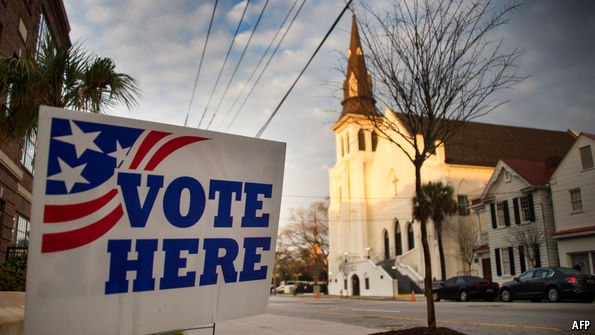The Economist attempts to explain the strange role that religion plays in American electoral politics.
…the role played by faith is neither static nor easily predictable. As recently as 2007, the share of people who said they would be put off by a candidate’s atheism was higher (63%) than now. The proportion who said a candidate’s non-belief in God would make no difference has jumped in the past nine years from 32% to 41%. Among all respondents in 2016, some 68% thought that religion was losing influence on American life. And behind these figures lies a much broader demographic trend. As an earlier Pew study showed, the share of religious “nones” or Americans who are religiously unaffiliated is surging: from 16% in 2007 to 23% in 2014. With numbers of evangelicals broadly steady at around 25% and mainline or liberal Protestants shrinking quite fast, that leaves a polarised landscape. Among Republican-leaning voters, evangelicals are the biggest religious camp, at 38%, and among Democrats, the “nones” are the biggest contingent, at 28%.
But that clearly doesn’t mean that the more evangelical you are, the more Republican voters will like you. In three out of four preliminary contests, the thrice-married, loosely churched Donald Trump has prevailed over Ted Cruz, whose fervent evangelicalism has been a main selling point. According to Robert Jones of the Public Religion Research Institute, Mr Trump appeals to the insecurities of an electoral cohort, white Christians, who sense that their influence over national life is waning; by pledging to “make America great again” he subliminally promises a return to a time when that influence was paramount.
As for Democratic voters, they are not all godless rationalists nor do they look for that quality in their candidates. Many accept Hillary Clinton’s claim to be strongly influenced by her Methodist faith, while many Republican voters regard her as not too or not at all religious. As for her rival Bernie Sanders, a secular Jew, many voters seem willing to give him the benefit of the spiritual doubt; among all respondents 40% deemed him “very” or “somewhat” religious, while only 30% discerned that quality in Mr Trump. But some pious voters do seem to have been persuaded that their churches would be safer, from terrorists or secularists, if a billionaire from New York was around to protect them.

